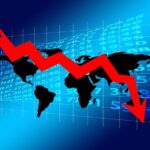Business lessons from 2008’s economic meltdown
“After 2008, it’s understandable that the average American would be as mad as hell at America’s business leaders. Executives, even in a good year, tend to rank towards the bottom in credibility with the public…The current economic crisis provides all the ammo for a populist backlash, as you – and your portfolio – know too well. The Fortune 500’s (market value) collapsed 37% last year, while the earnings of the 500 were even more of a disaster, dropping 85%”
RICK TETZELI, Fortune 500 (May 2009)
2008 was bad year in which to be a business leader, particularly in America. Fortune magazine’s annual survey of the 500 largest corporations throws up some interesting results, and gives much opportunity for reflection. A year in which large-company profits fall by 85% is by any measure a disastrous one – but one that provides food for thought.
A big talking number is $ 4.1 trillion, the loss in Fortune-500 market value – the biggest dollar and percentage decline since the magazine started keeping tabs 22 years ago. Shareholders are deeply unhappy even if you take a longer view: money invested in big-company US stocks since 1998 was dead money.
So what does the thoughtful executive learn from this fiasco? Most obviously, that business is about fundamentals: good products, good service, spirited employees and prudent management. For the worst-affected companies on the 500 list, that all went out of the window. AIG failed the prudence test most miserably, losing $99 billion on wild bets. It fell from 13th in the list in 2007 to an astonishing 245th, where it finds itself in the company of the likes of Genuine Parts, of Atlanta…
Everyone suffered in 2008, but some suffered less than others. Therein lies lesson no 2: discipline helps. Companies that have disciplined strategies and that stick to their course generally come out of a downturn less ragged than others. Apple, IBM, Berkshire Hathaway and Johnson & Johnson all belong in this category. Their leaders have charted clear strategies with clear rules, and it showed. J&J, for example, actually increased its profits by 22% last year, and has given its shareholders a stunning compounded annual return of 17% since 1944.
A third lesson comes from Ram Charan, noted author and consultant. He says that accountability will take precedence. CEOs will now have to answer to a higher authority: society. Executive pay will have to be transformed, and levels of corporate transparency will have to increase significantly to prevent a repeat of the events of 2008. President Barack Obama, in the same issue of the magazine, suggests that change is needed across the spectrum: from businesses themselves, to regulators government.
Indra Nooyi, Pepsico’s highly regarded boss, weighs in with the observation that the more corrosive crisis is one of trust: the daily exchange of trust between company and customer is damaged. She urges companies to focus on a higher purpose, as a force for good in the world. For this, a return to ethical values is needed in every company, and must be spearheaded from the top.
The biggest lesson of all? A corporation is only as good as its customers. Big companies boomed because their customers boomed: they bought and spent more and more. Companies went bust because they had misled their customers into a fake set of beliefs: that they could spend what they didn’t earn, and that they could own what they couldn’t afford.
The customer relationship is the most valuable – and most fragile – thing that a company owns. If it respects its customers, gives real value in its transactions with them, and is sincere in its relationship with them, customers will reward it in turn. What this meltdown demonstrated most vividly is that companies who delude and mislead their customers fall with them.

Buy Sunny Bindra's book
UP & AHEAD
here »
Popular Posts
- The ultimate flex—modestyMay 18, 2025
- Introducing SUNNY’S SIGNALMay 15, 2025
- How to ruin what you loveMay 25, 2025
- Change is so difficult—and so necessaryApril 27, 2025
- What should your business do in a downturn?April 20, 2025















